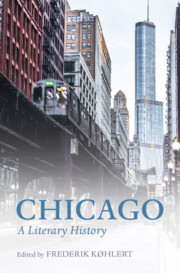Book contents
- Chicago: A Literary History
- Chicago
- Copyright page
- Contents
- Figures
- Contributors
- Acknowledgments
- Introduction: The Literary History of Chicago
- Part I The Rise of Chicago and the Literary West
- Part II Business Unusual: A New Urban American Literature
- Part III Radicalism, Modernism, and the Chicago Renaissance
- Part IV A City of Neighborhoods: The Great Depression, Sociology, and the Black Chicago Renaissance
- Chapter 17 Chicago Ecology and James T. Farrell’s Studs Lonigan
- Chapter 18 Chicago Gets the Blues: Migration, Depression, and the Black Renaissance
- Chapter 19 Black Chicago: Richard Wright’s South Side
- Chapter 20 Life in Bronzeville: Humanism and Community in the Work of Gwendolyn Brooks
- Chapter 21 Hustlers, Junkies, and Prostitutes: Nelson Algren’s White Slums
- Chapter 22 From Emptyland to Uncanny City: Saul Bellow’s Jewish Chicago
- Part V Traditions and Futures: Contemporary Chicago Literatures
- Selected Bibliography
- Index
Chapter 21 - Hustlers, Junkies, and Prostitutes: Nelson Algren’s White Slums
from Part IV - A City of Neighborhoods: The Great Depression, Sociology, and the Black Chicago Renaissance
Published online by Cambridge University Press: 02 September 2021
- Chicago: A Literary History
- Chicago
- Copyright page
- Contents
- Figures
- Contributors
- Acknowledgments
- Introduction: The Literary History of Chicago
- Part I The Rise of Chicago and the Literary West
- Part II Business Unusual: A New Urban American Literature
- Part III Radicalism, Modernism, and the Chicago Renaissance
- Part IV A City of Neighborhoods: The Great Depression, Sociology, and the Black Chicago Renaissance
- Chapter 17 Chicago Ecology and James T. Farrell’s Studs Lonigan
- Chapter 18 Chicago Gets the Blues: Migration, Depression, and the Black Renaissance
- Chapter 19 Black Chicago: Richard Wright’s South Side
- Chapter 20 Life in Bronzeville: Humanism and Community in the Work of Gwendolyn Brooks
- Chapter 21 Hustlers, Junkies, and Prostitutes: Nelson Algren’s White Slums
- Chapter 22 From Emptyland to Uncanny City: Saul Bellow’s Jewish Chicago
- Part V Traditions and Futures: Contemporary Chicago Literatures
- Selected Bibliography
- Index
Summary
To Nelson Algren, the alleys, backstreets, and pool halls of Chicago constituted a frontier in their own right, with the Polish triangle of Wabanasia, Milwaukee, and Division forming the bulwark of a neighborhood peopled by those whose pulses could only be read in terms of the class, race, and ethnicity which defined their very existence. These were the multitude of Americans who are not recognized, who are largely excluded from American society, and Algren assumed the task of ensuring their visibility. Yet Algren’s insistence that the excluded were worth our attention, that their lives were important, came at a time when American criticism was moving away from the social realism of his work. By the 1950s, the propagation of monolithic values rooted in the premise of classless consumption formed a consensus that shifted the reality of class to a point where those who continued to address it were regarded at best as curiosities. Like the subject of his fiction, then, Algren’s work was excluded, moved to the periphery, as this important author fell victim to the myths of Cold War homogeneity.
- Type
- Chapter
- Information
- ChicagoA Literary History, pp. 295 - 308Publisher: Cambridge University PressPrint publication year: 2021



